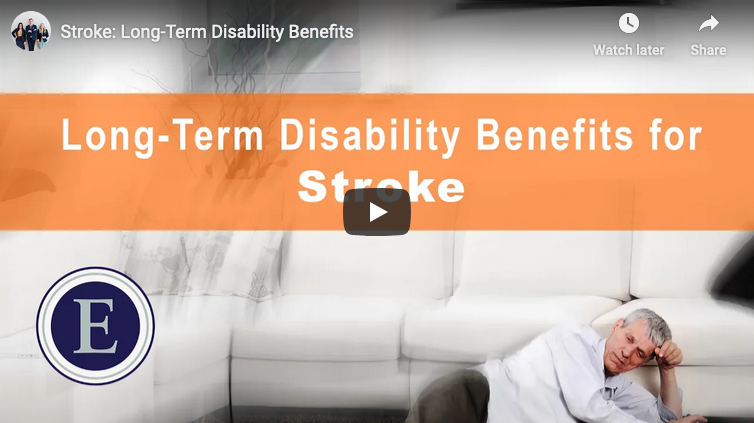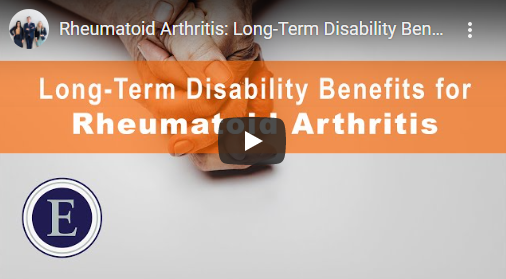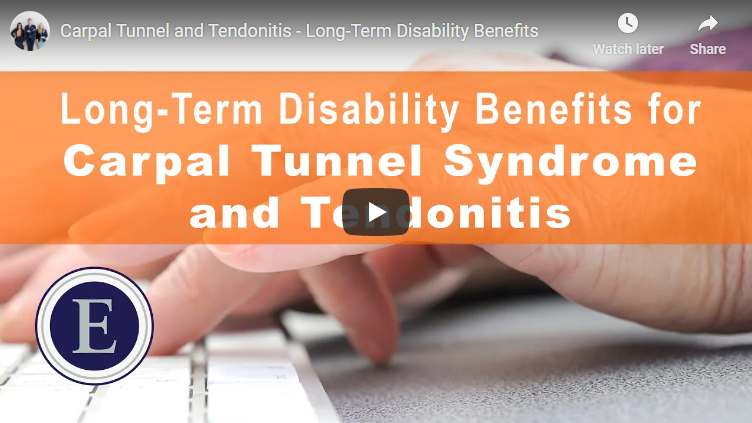Do I Qualify for Long-Term Disability Benefits if I Have Obsessive-Compulsive Disorder?
Can I Get Long-Term Disability Benefits for Obsessive-Compulsive Disorder?
One of the most common questions we get is “Do I qualify for long-term disability benefits if I have Obsessive-Compulsive Disorder?”
Obsessive-Compulsive Disorder, also referred to as OCD, is recognized as unwanted thoughts (obsessions) that induce repetitive behaviours (compulsions). OCD can have a significant affect on employment and daily life.
Therefore, OCD can qualify for long-term disability benefits – provided it is not excluded by your insurance policy wording.
LTD Denied? Which Category Do You Fit In?
Category 1: The insurance company denied your initial claim for disability benefits for Obsessive-Compulsive Disorder.
Category 2: The insurance company denied your appeal.
Category 3: The insurance company discontinued or terminated your benefits.
What Can We Do For You?
We’ll work with you and your physician to help challenge the insurance company’s denial or discontinuance of your long-term disability benefits.
Where necessary, we will engage other trusted professionals to support your case including specialists, functional capacity evaluators, and vocational evaluators to help credibly explain why your disability symptoms are preventing you from doing your “own occupation” or “any occupation”.
Our Help Can Make All The Difference. How?
- Over 25 years’ combined experience getting our clients the benefits they deserve.
- Expertise in both disability and employment law (your employment status is directly linked with your disability)
- We offer a free case assessment
- We offer flexible rates, including contingency fees (i.e., only pay if you win)
- Service across all of Ontario


Obsessive-Compulsive Disorder: Overview
Obsessive-Compulsive Disorder, or OCD, is a pattern of intrusive thoughts and feelings (obsessions), followed by repeated actions (compulsions), which are usually completed to ease the stress brought on by irrational fears.
OCD most commonly develops in teenagers or young adults, however, can present itself in early childhood as well.
OCD symptoms worsen under stress, and often evolve or change over time. Severity of symptoms vary, ranging from mild to completely disabling.
It is believed that OCD can be the result of a number of factors including; genetics, biology, co-existing mental health issues, stressful life circumstances, or learned behaviour.
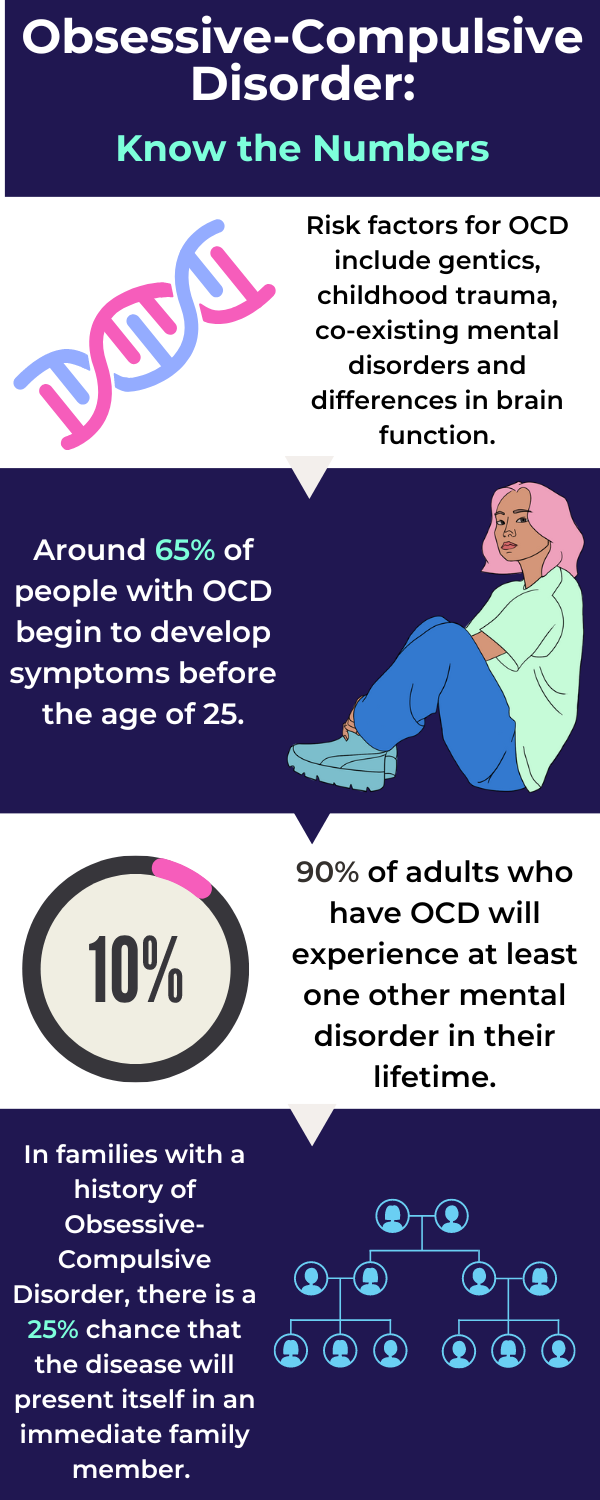
Most Common Symptoms of Obsessive-Compulsive Disorder
Symptoms of OCD include but are not limited to:
Obsessions
Obsessions often follow a theme, such as:
- Fear of dirt or contamination
- Fear of disorganization
- Aggressive thoughts about harming yourself or others
Symptoms of obsessions include:
- Avoiding objects touched by others
- Thoughts about acting inappropriately in public settings
- Intense stress in response to disorganization
- Doubts about completing tasks (such as locking the door)
Compulsions
Compulsions are in response to the anxiety that obsessions bring on. People with Obsessive-Compulsive Disorder believe that completing certain compulsions will prevent bad things from happening, or will relieve the stress of obsessions (however, this relief is always temporary).
Symptoms of compulsions include:
- Hand washing to the point of skin becoming raw
- Repeated words or phrases
- Repeatedly checking completed tasks (such as checking if the stove is turned off)
- Arranging objects in certain patterns
Criteria for a Diagnosis of Obsessive-Compulsive Disorder
OCD can be difficult to diagnose due to its shared symptoms with other mental health disorders.
Your Doctor should ask you about your medical and family history as this disorder can be inherited. A psychological evaluation should be made through a discussion between you and your Physician about your symptoms and their impact on your daily life. Family and friends may also be asked to share their knowledge of the severity of your symptoms, as those with OCD often feel insecure about their behaviour and withhold information. Your Doctor should also complete a physical examination to rule out any physical explanations for your symptoms.
The diagnosis of OCD is based, to a large extent, on self-reported symptoms, and long-term disability insurers often deny these claims.
Treatment for Obsessive-Compulsive Disorder
Medication
OCD is initially treated with antidepressants such as Clomipramine, Fluoxetine, Sertraline and Paroxetine. (3)Depression often co-exists with Obsessive-Compulsive Disorder, and is therefor treated by the use of antidepressants as well.
Psychotherapy
Psychotherapy is usually recommended to those with Depression on top of medication. The two most effective forms of “talk therapy” for people with Depression are:
Cognitive-behavioural therapy (CBT)- A goal-oriented approach to developing skills and strategies for creating and maintaining healthy habits.
Exposure and Response Prevention (ERP)- ERP focuses on exposing yourself to triggers and obsessive thoughts and ideas, while learning preventative measures in regard to compulsions.
Alternative Therapy
Residential or Rigorous Outpatient Programs- Depending on the severity of your symptoms, outpatient or residential programs may be an effective form of treatment. Many of these programs follow Exposure and Response Prevention.
Deep Brain Stimulation (DBS)- Deep Brain Stimulation is recommended for patients who do not respond well to traditional treatments for Obsessive-Compulsive Disorder. In this treatment plan, electrodes are implanted within specific areas of your brain, with the intention of producing electric impulses to prevent atypical impulses.
Transcranial Magnetic Stimulation (TMS)- TMS is suggested to patients who have not responded to typical OCD treatments. Transcranial Magnetic Stimulation involves placing an electromagnetic coil against your scalp, which produces a magnetic pulse, stimulating nerve cells in the brain, and potentially improving OCD symptoms. TMS is often preferred over other alternative therapy options as it is a non-invasive procedure.

Obsessive-Compulsive Disorder & Your Employment
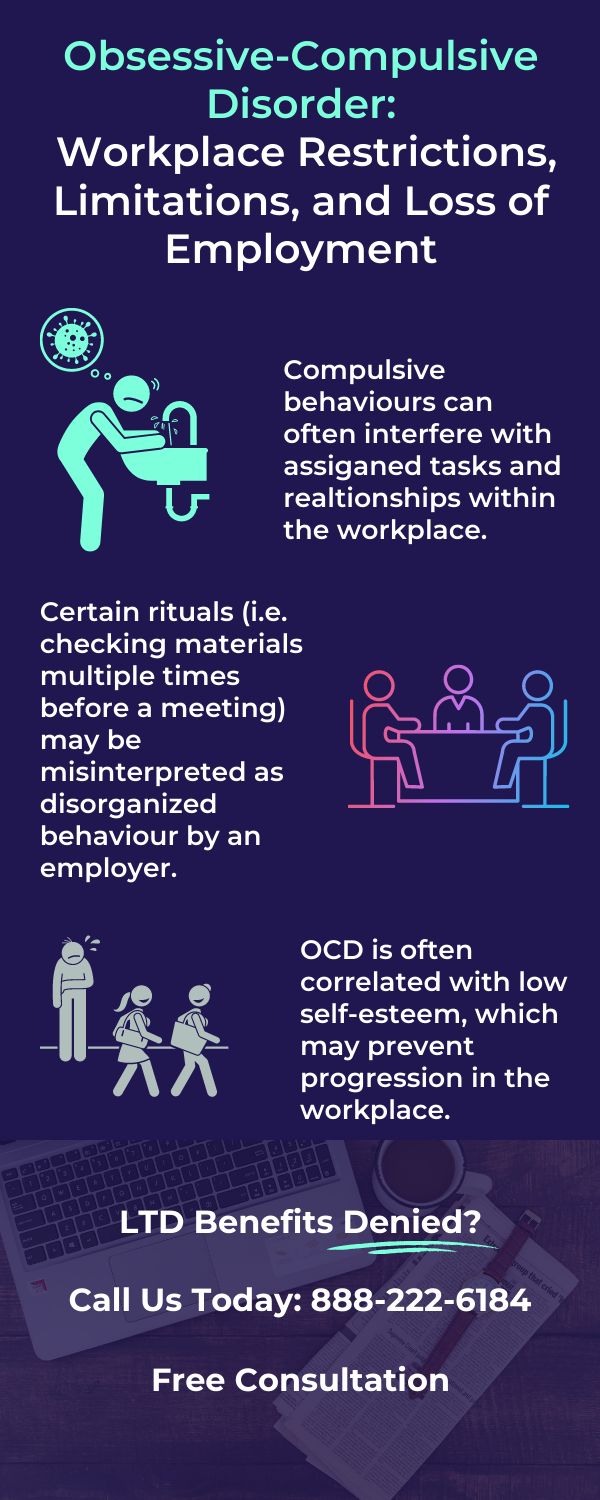
Workplace Restrictions Caused by Obsessive-Compulsive Disorder
When considering your employment and OCD diagnosis, consider how stable your condition is, how safe you are to do your job and what the demands are physically and mentally.
Many individuals suffering from Parkinson’s disease may experience anxiety, intrusive thoughts, or stress in response to disorganization.
Obsessive-Compulsive Disorder and Workplace Discrimination
It is unlawful to discriminate against someone in the area of employment based on their physical disability: Ontario’s Human Rights Code and the Canadian Human Rights Act.
If you are suffering from OCD, you might face discrimination in a variety of ways:
- You experience employment termination because you have OCD.
- You are denied accommodation because of your OCD.
- After returning from a disability leave, your employer places you in a lower, part-time position at a lower rate of pay.
- Someone makes unwelcome remarks or jokes about your disability.
- Someone offends or humiliates you physically or verbally threatens or intimidates you because of your disability.
- Retaliating against you for filing a human rights complaint.
Ertl Lawyers are experts in Employment and Disability Law. If you have been discriminated against, our disability and employment lawyers in Toronto can help, including:
- Having your employer comply with their duty to accommodate you.
- Having your employer stop all forms of discriminatory conduct.
- Representing you in wrongful dismissal in Ontario, constructive dismissal, and human rights matters.
- Ensuring that your employer complies with its statutory obligations, including its obligations under the Employment Standards Act.
- Negotiation severance packages (including continuation of benefits).

Obsessive-Compulsive Disorder & Insurance Companies
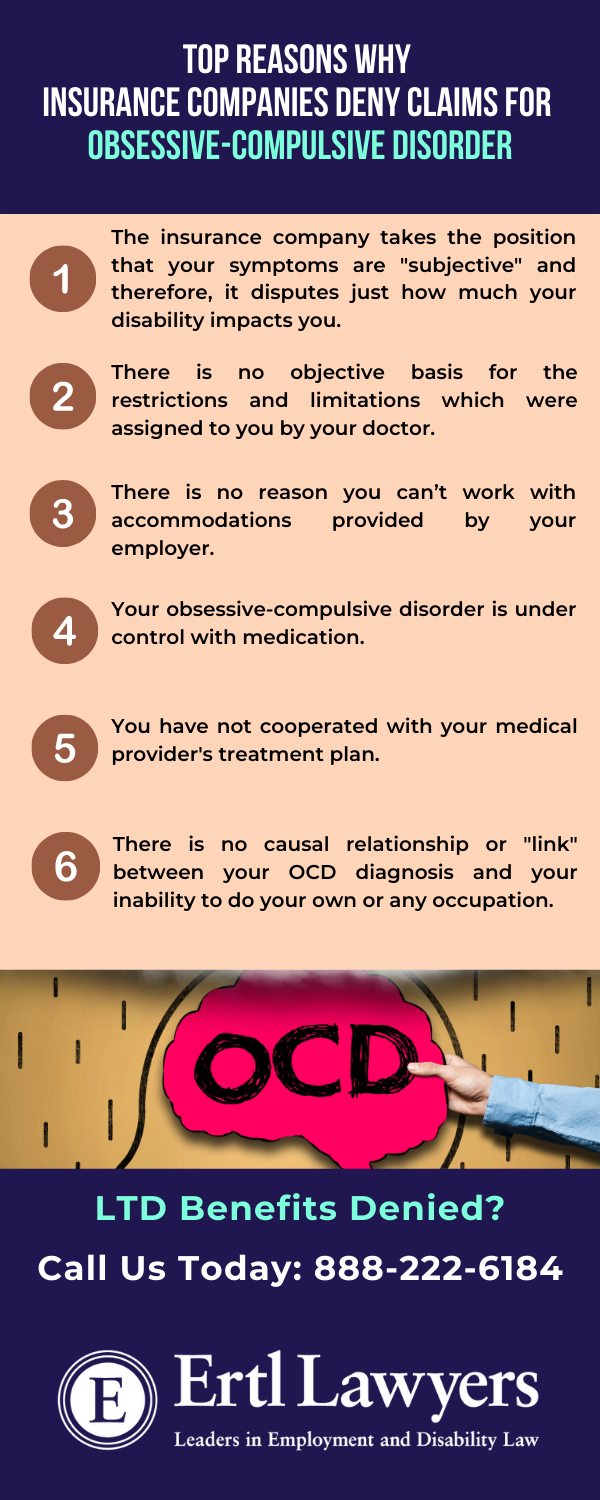
Apply for Long-Term Disability Benefits for Obsessive-Compulsive Disorder?
Review Your Policy Carefully
Your entitlement to disability benefits for OCD depends on the specific wording of your disability policy.
Therefore, you will need to review your policy and see how it defines things like “totally disabled” and “occupation” – and whether any exclusions apply (particularly for pre-existing conditions).
Gather Medical Evidence
To be entitled to disability benefits for OCD every insurer requires you to provide medical evidence documenting how your illness or injury causes restrictions or lack of ability, such that you are prevented from performing the essential duties of your occupation.
Therefore, you will need a copy of your medical records to see if there is an objective basis for your diagnosis of OCD and what your medical records say about your symptoms and your restrictions and limitations.
Gather Evidence of Workplace Limitations
Because your entitlement to long-term disability benefits for OCD depends on the strength of your evidence, you should get a copy of your employee file from work. It may show your OCD negatively impacted your work performance. Your work performance may have been affected by frequent absences from work, decreased motivation, etc.
Create a List of the Physical Duties of Your Job
You should get a copy of your job description. Based on that job description, you should write out a detailed list of the physical (and mental) duties associated with your job description – and explain how your OCD limits or prevents you from performing your own occupation.
Ask Your Doctor for a Report
It is recommended that you provide your doctor with your occupational description. You should ask your Doctor to prepare a report that clearly explains the objective basis for:
- Your diagnosis of OCD
- Your restrictions and limitations
- Reasons why you are unable to perform some or all of the essential duties of your own occupation.
Follow Your Doctor’s treatment Plan
Your entitlement to long-term disability benefits also requires you to be receiving regular, ongoing care and treatment for your OCD. In other words, don’t skip appointments, and always follow your doctor’s treatment plans.
Keep a Diary
On your end, it is important to keep a diary tracking your symptoms, and whether your treatment is helping.
What Other Benefits Might I Be Entitled to for Obsessive-Compulsive Disorder?
Other than short-term and long-term disability benefits through a group or individual insurance plan, people suffering from OCD might be entitled to one or more of the following benefits:
- Employment Insurance (EI) Sickness Benefits;
- Ontario Disability Support Plan (ODSP);
- Disability Tax Credit (DTC);
- Disability Creditor Insurance (under your mortgage or credit cards);
- Trillium (extended health benefits);
- Canada Pension Plan Disability (CPP-D); and
- Disability Pension (employer).
Organizations / Associations / Colleges
Disclaimer: The content on this web site is provided for general information purposes only and does not constitute legal, medical, or other professional advice or an opinion of any kind. Users of this web site are advised to seek specific legal advice by contacting members of Ertl Lawyers (or their own legal counsel) regarding any specific legal issues. Ertl Lawyers does not warrant or guarantee the quality, accuracy or completeness of any information on this web site
Sources:
(3)https://iocdf.org/about-ocd/ocd-treatment/meds/
(4)https://iocdf.org/about-ocd/ocd-treatment/erp/
(6)https://cmha.bc.ca/documents/obsessive-compulsive-disorder-2/
Long-Term Disability Benefits Denied?
Ertl Lawyers provides expert representation in long-term disability matters.
The vast majority of disability matters are resolved through negotiation and mediation – and that’s because insurance companies know that we are passionate about our clients’ rights.
How we can help you:
• free disability policy analysis
• free case assessment
• applying for disability benefits
• appealing a denial or termination of your benefits
• disputing a denial through a legal claim
• handling all communications with your employer
• protecting your employment
• prosecuting human rights claims
Fair, Flexible Rates – Including Contingency Fees
(Don’t Pay Unless You Win)
Our Help Can Make All The Difference.
Related Blogs
Understanding the Duty to Accommodate Laws in Canada
Laws regarding duty to accommodate aim to level the playing field in situations that inherently discriminate against individuals based on factors they cannot control, and which are protected in various Canadian statutes. These protected (or prohibited) factors usually...
What Qualifies for Long-Term Disability in Canada?
Long-term disability (LTD) benefits are paid out by insurance companies according to the policy purchased by a worker, their union/association or their employer, and each has specific rules regarding how you qualify for long-term disability benefits. The general rule...
How to Apply for Long-Term Disability
One of the many things the COVID-19 pandemic made crystal clear, if it wasn't already, is that our health is often out of our control. Be it mental or physical, illnesses and injuries are mostly unexpected and can completely disrupt our lives, especially conditions...




